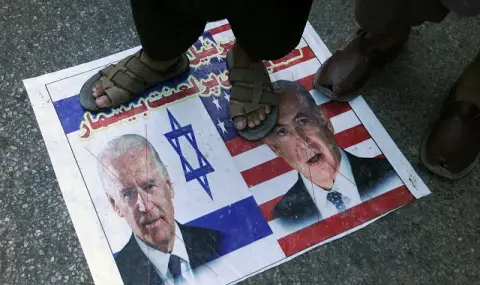Until the Islamic Revolution in 1979, Israel and Iran were close allies. After that, however, they gradually became implacable enemies. How and why this happened.
Iran and Israel have been at odds for decades. The mullahs' regime denies Israel's right to exist as a state, and Israel views Iran as its arch-enemy. But this was not always the case.
Allies against the Arab states
Until the Islamic Revolution in 1979, Israel and Iran were close allies. Iran was even one of the first countries to recognize Israel in 1948. And Israel saw Iran as an ally against the Arab states.
Israel trained Iranian agricultural experts and provided know-how and assistance in the creation and training of the Persian armed forces. The then ruler of Iran, Shah Mohammad Reza Pahlavi, paid with oil, which Israel urgently needed to ensure its economic rise.
Iran was home to the second largest Jewish community outside of Israel. After 1979, many Jews left the country, but more than 20,000 Jews still live in the Islamic Republic today. After the revolution, the religious wing of Ayatollah Ruhollah Khomeini, which gained the upper hand among the revolutionaries, annulled all of Tehran's treaties with Israel. Khomeini himself then sharply criticized Israel for occupying the Palestinian territories.
Iran uses feud with Israel to gain influence
Tehran has gradually sharpened its rhetoric against Israel in order to win the favor of Arab states and the sympathy of their populations. In this way, the regime in Iran wanted to increase its own influence. When Israel intervened in Lebanon's civil war in 1982 and invaded the south of the country, Khomeini sent Iranian Revolutionary Guards to Beirut to support Shiite militias there. To this day, the Hezbollah militia that emerged at that time is considered the “long arm” of Tehran in Lebanon.
Current religious leader Ali Khamenei continues this line. He, like the entire leadership of the Islamic Republic, casts doubt on the historical facts about the systematic killing of Jews during the Nazi regime in Germany and tries to relativize and deny the Holocaust.
And Israel is not working to reduce tensions
Iran is trying to strengthen its position not only against Israel, but also against Saudi Arabia by supporting Hezbollah in Lebanon, Hamas in Gaza, Syrian President Assad, the Houthis in Yemen, etc. Islamic resistance movements in Iraq. One of the architects of these undeclared wars was Revolutionary Guard General Qassem Soleimani, who was killed in a US drone strike in early 2020.
Israel also took no particular action to reduce tensions. Prime Minister Benjamin Netanyahu has on several occasions compared the Islamic Republic to Nazi Germany. He described the 2015 nuclear deal, which was negotiated by the permanent members of the UN Security Council, Germany and Iran, as a “mistake of historic proportions”.
Netanyahu has repeatedly said that he will prevent the creation of a nuclear bomb by Iran "by all possible means". Israel has repeatedly sabotaged Iran's nuclear program. In 2020, its leader Mohsen Fakhrizadeh was killed. The “Guardian“ and “The New York Times” reported at the time that all the evidence points to a targeted assassination by the Israeli secret services. Israel neither claimed responsibility nor denied being behind the attack.
Many Iranians and Jews want an end to the tension
However, different voices are heard among the populations of the two countries. “Iran must review its relations with Israel because they no longer meet modern needs,” Fayseh Hashemi Rafsanjani said in an interview at the end of 2021. Fayseh is the daughter of former Iranian President Ali Akbar Hashemi Rafsanjani and a former member of parliament. Prominent political scientist Sadegh Zibakalam has also repeatedly criticized Iran's policy towards Israel. "This position isolates the country on the international scene," the professor from the University of Tehran emphasized in an interview with DV in 2022.
And in Israel there have always been people who have stood in solidarity with the people of Iran. For example, the initiative on social networks "Israel loves Iran", which dates back to 2012. In 2023, a similar campaign was launched in support of Iranians who took to the streets after the assassination of Mahsa Gina Amini.
At the political level, however, the fronts seem more hardened than ever - especially after the terrorist attack by Hamas against Israel on October 7, 2023 and the ensuing “revenge war”, as Netanyahu calls it.
